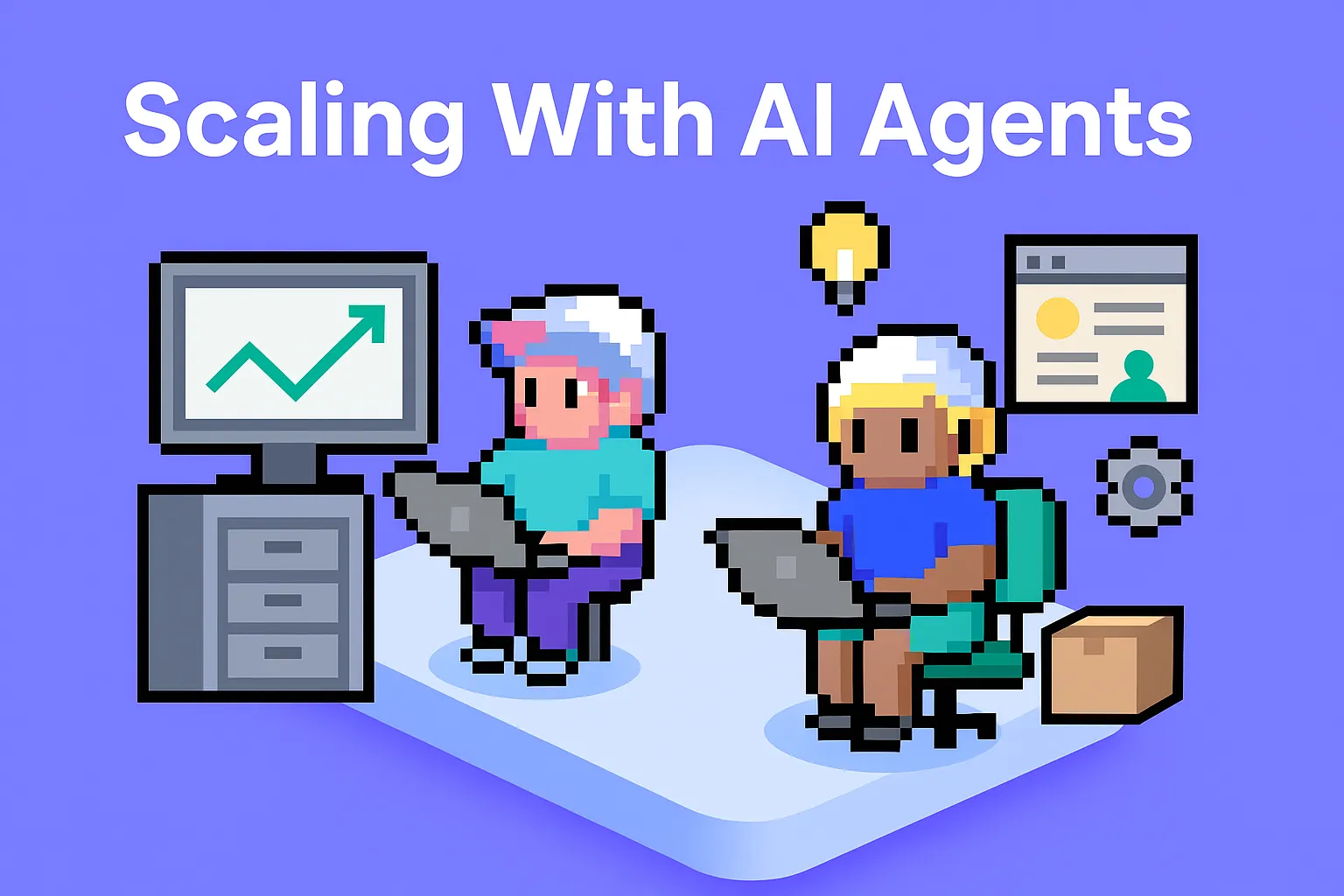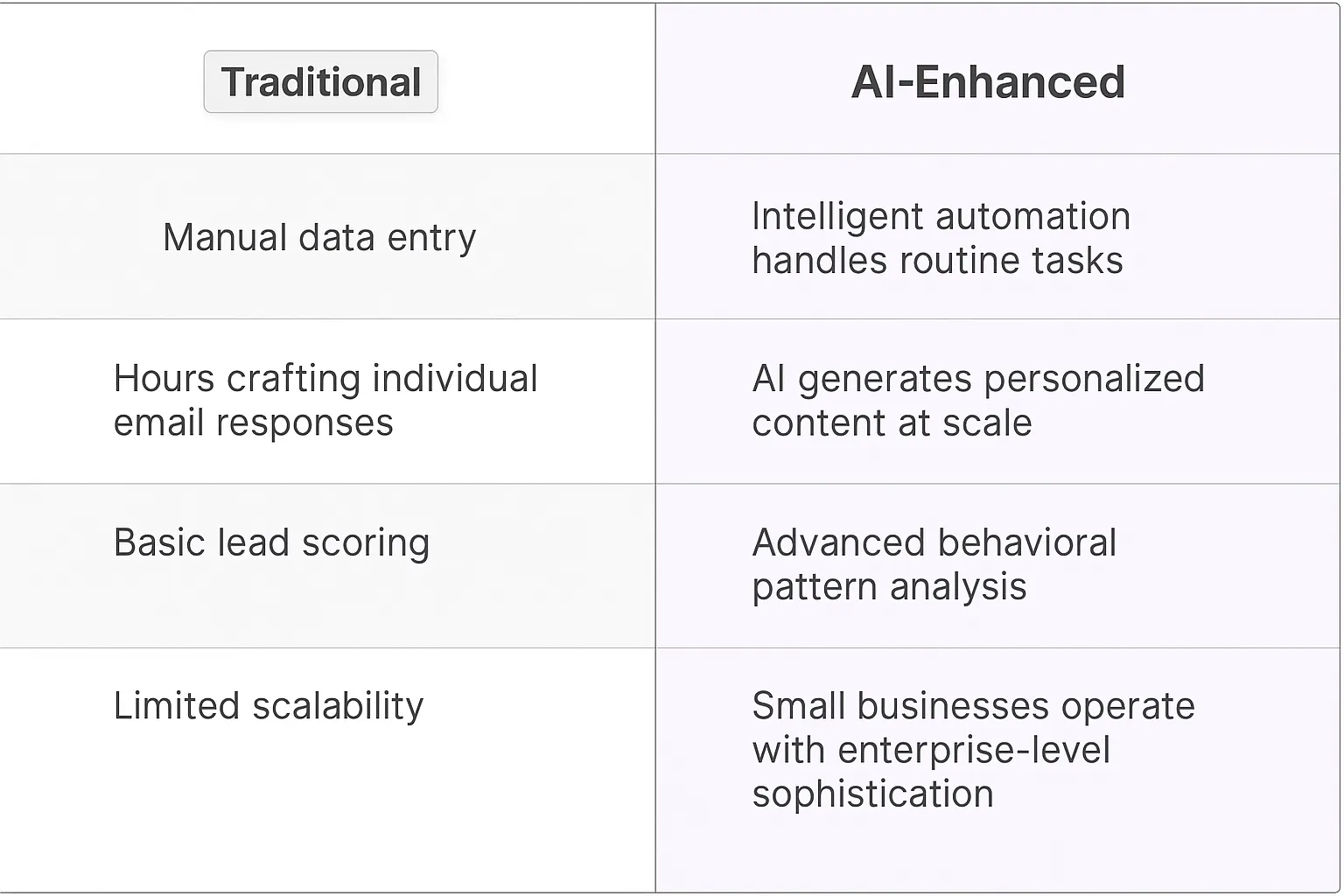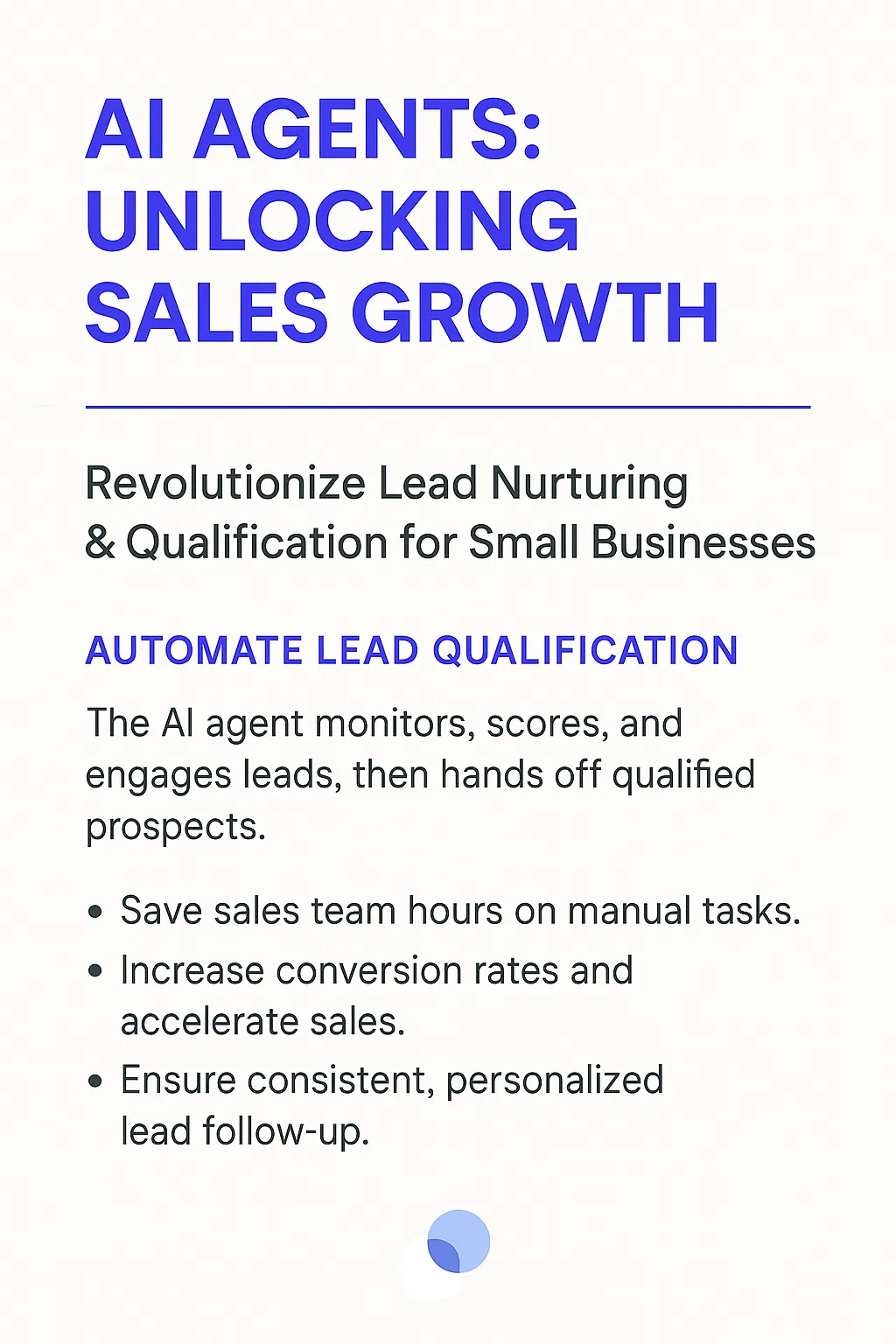Keap
Understanding Keap's CRM Platform and Core Capabilities
What is Keap?
Keap stands as a comprehensive CRM and marketing automation platform designed specifically for small businesses and entrepreneurs. The platform combines contact management, email marketing, sales pipeline tracking, and automated follow-up sequences into a unified system. Unlike enterprise-focused CRMs, Keap emphasizes simplicity and practical functionality that directly addresses small business challenges.
Key Features of Keap
- Contact Management: Advanced segmentation and tagging capabilities
- Marketing Automation: Multi-step campaign creation and management
- Sales Pipeline: Visual deal tracking and opportunity management
- E-commerce Integration: Direct payment processing and invoice tracking
- Mobile Accessibility: Full platform functionality on mobile devices
- Reporting Tools: Customizable dashboards and performance metrics

Benefits of AI Agents for Keap
What would have been used before AI Agents?
Small business owners using Keap traditionally relied on manual data entry, repetitive follow-ups, and time-consuming customer relationship management. They'd spend hours crafting individual email responses, updating contact records, and trying to piece together customer interactions across multiple channels. The standard workflow involved toggling between screens, copying and pasting information, and maintaining complex spreadsheets to track customer engagement.
What are the benefits of AI Agents?
AI Agents transform how small businesses operate within Keap by eliminating the cognitive overhead of routine tasks. These digital teammates handle the heavy lifting of contact management by automatically enriching customer profiles with relevant data points and behavioral patterns.
The network effects are particularly powerful - as AI Agents learn from interactions across the Keap ecosystem, they become increasingly adept at identifying high-value opportunities and engagement patterns. They can spot when a lead is ready for follow-up based on subtle signals that humans might miss.
For sales automation, AI Agents excel at maintaining consistent communication cadences without the fatigue that affects human teams. They can analyze response rates, adjust message timing, and personalize content at scale - tasks that would require multiple full-time employees to accomplish manually.
The most compelling benefit is how AI Agents augment rather than replace human capabilities. While handling routine tasks, they surface insights that help business owners make better strategic decisions. For example, they can identify trending topics in customer communications or flag accounts showing signs of churn risk before it becomes obvious.
From a growth perspective, AI Agents enable small businesses to operate with the sophistication of much larger organizations. They create leverage by managing thousands of personalized interactions while business owners focus on high-value activities like relationship building and strategic planning.

Potential Use Cases of AI Agents with Keap
Processes
AI Agents transform how small businesses handle their Keap CRM operations through intelligent automation and data-driven decision making. The agents monitor customer interactions, analyze engagement patterns, and proactively suggest personalized follow-up sequences based on prospect behavior.
When integrated with Keap's marketing automation features, AI Agents can:
- Analyze email campaign performance and automatically adjust sending times for optimal open rates
- Generate dynamic content variations based on customer segments and historical engagement data
- Monitor lead scoring patterns and refine qualification criteria based on conversion outcomes
- Create targeted upsell recommendations using purchase history and browsing behavior
Tasks
The granular task execution capabilities of AI Agents unlock new levels of efficiency within Keap's ecosystem:
- Contact Database Management
- Detect and merge duplicate contacts
- Enrich contact profiles with social media and public data
- Tag and categorize contacts based on interaction patterns
- Campaign Optimization
- Draft email copy variants for A/B testing
- Generate personalized subject lines at scale
- Create segment-specific landing page content
- Sales Pipeline Management
- Score leads based on engagement signals
- Draft follow-up messages using conversation history
- Schedule optimal times for sales team outreach
- Reporting and Analytics
- Generate natural language campaign performance summaries
- Identify trending customer behaviors and preferences
- Flag potential churn risks based on engagement drops
The combination of Keap's robust CRM capabilities and AI Agents creates a powerful system for small businesses to scale their marketing and sales operations while maintaining personalized customer relationships. These digital teammates handle the heavy lifting of data analysis and routine tasks, enabling teams to focus on strategy and high-value customer interactions.

Industry Use Cases
The integration of AI agents with Keap opens up powerful new possibilities across multiple business sectors. Small businesses and entrepreneurs leverage these digital teammates in ways that fundamentally transform their customer relationships and sales processes. From real estate firms automating their lead nurturing to consulting practices scaling their client communications, the applications are both practical and impactful.
What makes Keap's AI implementation particularly interesting is how it adapts to industry-specific needs. A fitness studio owner uses it differently than an insurance broker, yet both achieve meaningful efficiency gains. The key is how these AI capabilities map to existing business processes while uncovering opportunities that weren't previously visible or feasible.
Looking at specific industry examples helps illustrate the depth and breadth of what's possible when businesses harness AI within their Keap workflows. The following use cases demonstrate how different sectors extract unique value while maintaining the personal touch that's essential for sustainable growth.
Real Estate Agents: Scaling Personal Touch with Keap AI
Real estate agents face a unique challenge - maintaining genuine relationships with hundreds of potential buyers and sellers while juggling property showings, market analysis, and deal negotiations. The traditional approach of manually tracking follow-ups and client preferences simply doesn't scale.
A Keap AI agent transforms how agents nurture their sphere of influence. When integrated with an agent's CRM data, the AI can analyze past client interactions, property preferences, and communication patterns to deliver personalized outreach at the right moments.
For example, when a past client mentions home renovations in an email exchange, the AI agent automatically creates targeted follow-up sequences discussing current market values and equity positions. It can draft personalized market updates highlighting properties that match specific client criteria, while maintaining the agent's authentic voice and relationship context.
The AI also excels at qualifying new leads through natural conversation, gathering key details about timeframes, budgets, and preferences without the back-and-forth email tag that typically consumes an agent's day. This intelligence feeds directly into Keap's automation tools to route leads appropriately.
Most critically, the AI serves as an always-on relationship manager, identifying opportunities for meaningful touchpoints - from work anniversaries to life events - that strengthen client bonds. This systematic approach to lead nurturing compounds over time, building a sustainable referral engine that drives real estate success.
The end result? Agents can focus their limited time on high-value activities like in-person showings and negotiations, while their AI teammate handles the crucial but time-intensive work of database management and follow-up. It's not about replacing the agent's personal touch, but rather amplifying it across a larger network.
Professional Services: Scaling High-Touch Consulting with Keap AI
Professional service providers - consultants, coaches, and advisors - build their businesses on deep expertise and trusted relationships. But the traditional model of trading time for money creates a natural ceiling on growth. The most successful consultants have cracked this by leveraging AI to extend their reach while preserving their unique value.
A Keap AI agent acts as a knowledge multiplier for consultants. By analyzing past client engagements, methodologies, and communication patterns, it learns to deliver contextual guidance that reflects the consultant's proven frameworks and approaches.
Take a business strategy consultant working with growth-stage startups. Their AI teammate can conduct initial discovery conversations with potential clients, using natural dialogue to understand challenges, gather key metrics, and identify red flags. This intelligence feeds directly into Keap's automation tools, allowing the consultant to enter conversations with deep context.
Between formal engagements, the AI maintains ongoing client relationships through proactive check-ins and milestone tracking. When a client mentions a new initiative or challenge, the AI can surface relevant case studies and frameworks from the consultant's knowledge base, delivering value while creating opportunities for deeper engagement.
The system becomes particularly powerful in group coaching programs. While the consultant delivers high-leverage group sessions, their AI teammate provides personalized support to individual participants - answering questions, reviewing assignments, and flagging when someone needs additional attention.
This model allows consultants to shift from purely trading hours for dollars to building scalable intellectual property. Their expertise gets encoded into the AI's knowledge base, creating compounding value over time. The consultant focuses on their highest-value activities - strategy development, relationship building, and methodology refinement - while their digital teammate handles the crucial but time-intensive aspects of client success.
Considerations for Keap AI Implementation
Implementing AI agents within Keap's ecosystem requires careful planning and strategic thinking. The integration touches multiple aspects of business operations, from data handling to team dynamics.
Technical Considerations
Data quality stands as the foundation for effective AI implementation in Keap. Organizations need clean, structured customer data and well-documented processes before deployment. The system requires proper API configurations and regular maintenance of integration points between Keap and other business tools.
Security protocols demand particular attention, especially regarding customer information handling. Teams must establish clear data access levels and encryption standards that align with industry regulations while maintaining system performance.
Operational Adjustments
Teams often underestimate the learning curve associated with AI adoption. Staff members need dedicated training time to understand how to leverage AI capabilities effectively within Keap. This includes learning new workflows, understanding AI limitations, and developing protocols for handling edge cases.
Process documentation becomes critical during implementation. Teams should map out existing workflows and identify areas where AI can enhance rather than disrupt current operations. This mapping helps prevent workflow bottlenecks and ensures smooth transitions.
Resource Management
Budget allocation needs to account for both initial setup and ongoing maintenance. Organizations should factor in costs for potential customizations, training programs, and system updates. The implementation timeline typically spans several months, requiring dedicated project management resources.
Success metrics need clear definition before deployment. Teams should establish KPIs that align with business objectives, whether focusing on customer response times, lead conversion rates, or operational efficiency gains.
Change Management
Resistance to new technology often emerges during implementation. A structured change management approach helps address concerns and ensures team buy-in. Regular communication about implementation progress and quick wins helps maintain momentum and engagement.
Creating feedback loops between users and implementation teams enables continuous improvement. This iterative approach helps refine AI capabilities and ensures the system evolves with business needs.
Empowering Small Business Growth Through AI-Enhanced CRM
The fusion of AI Agents with Keap represents a significant shift in how small businesses manage customer relationships and scale operations. These digital teammates don't just automate tasks - they create new possibilities for growth while preserving the personal touch that makes small businesses special. As AI technology continues evolving, businesses that master this integration will find themselves with a substantial competitive advantage. The key lies not in replacing human interaction, but in amplifying it through intelligent automation and data-driven insights.













